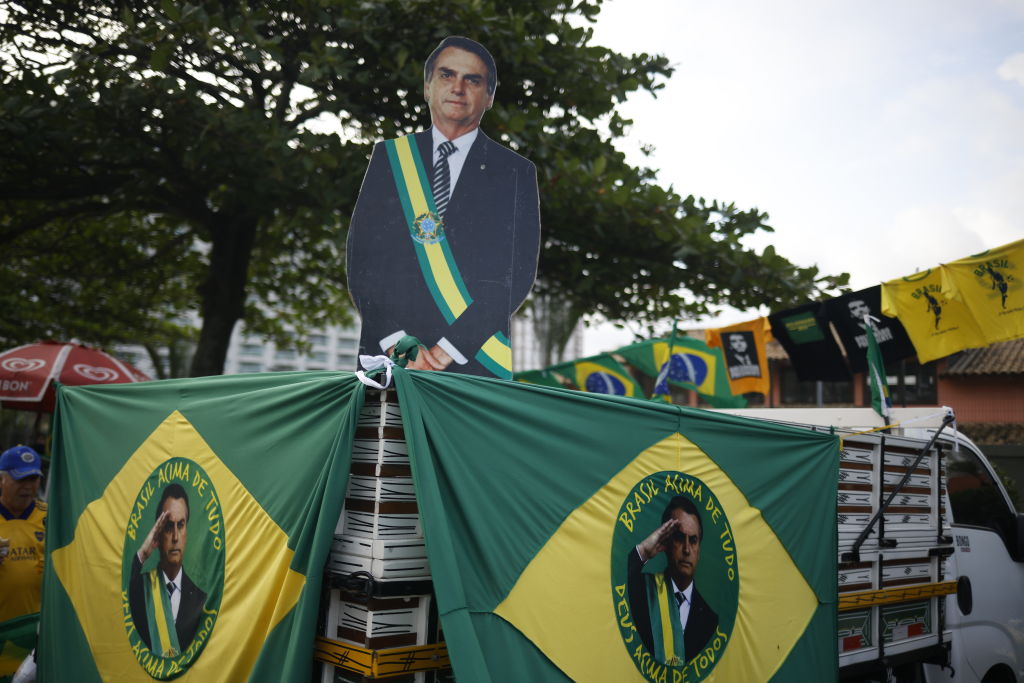Brazilian voters backed Luis Inácio Lula da Silva, a left-wing former President, over the incumbent and right-wing President Jair Bolsonaro by a narrow margin in the first round of elections on Sunday. With 99.9% of the vote counted, Lula—as the former President is universally known—got 48.4% of the vote to Bolsonaro’s 43.2%.
Because neither candidate won a majority, the contest will go to a run-off on Oct. 30.
For most of 2022, polls had suggested no candidate would win more than 50% of the vote and the contest would go to a second round—as has happened in all of Brazil’s elections for the last two decades.
In recent weeks, however, Lula had extended his lead in the polls by a wide enough margin that many experts had predicted he might even win outright in the first round. Bolsonaro had told his supporters not to believe the polls though, and Sunday’s results show he significantly outperformed expectations.
That means that the battle between Bolsonaro and Lula—already one of the most polarizing political clashes in Brazil’s modern history—will continue for weeks. Both are bombastic, divisive figures with sharply divergent visions for the country of 200 million people. And the second round in Latin America’s largest democracy is now set to be unexpectedly competitive.
Lula, a 76-year-old former union leader, has seen his Worker’s Party tarnished by a vast corruption scandal over the last decade. But he remains Brazil’s most widely beloved political leader. Lula has promised to rebuild public services for poorer Brazilians, address inequality, and return the economy to the boom times of his 2003-2010 presidency—a tall order in current global economic conditions.

Bolsonaro, 67, had pledged to continue his relaxation of the country’s gun laws and environmental regulations, and fight against so-called liberal “gender ideology.” Bolsonaro has faced a series of scandals involving alleged abuses of power since taking office in 2019, including attempts to intervene in the federal police and high profile clashes with Brazil’s supreme court.
Read More: Political Violence Is Surging Ahead of Brazil’s Election
The international community’s eyes will remain on Brazil in the coming weeks amid what could be a turbulent period. Bolsonaro, an avowed supporter of the country’s brutal 20th century military dictatorship, has often implied that he would not accept the election result if he loses. “Only God can remove me from office,” he said in September 2021. In recent months, Bolsonaro and his supporters have repeatedly questioned the integrity of Brazil’s electoral system, without offering evidence for their claims. Just four days before the vote, his conservative Liberal Party released a document warning that some election workers had the “absolute power to manipulate election results without leaving a trace.”
Many observers see clear echoes of U.S. President Donald Trump’s behavior in the run up to the 2020 election, and have warned that Bolsonaro is preparing supporters to stage a Brazilian version of the Jan. 6 insurrection at the Capitol. Even more troublingly, certain sections of Brazil’s armed forces have refused to condemn Bolsonaro’s anti-democratic statements ahead of the ballot, raising fears that he may have military backing for an attempt to illegally hold onto office.
Read More: Why ‘Stop the Steal’ Could Soon Reach Brazil
Polls have predicted Lula would likely secure a return to the presidency later this month. It would be a dramatic about-face in the leftist leader’s story. In 2017, a federal judge sentenced Lula to nearly 10 years in prison for allegedly receiving a luxury apartment as a bribe, and a court banned him from participating in politics from behind bars. But in 2021, Brazil’s Supreme Court annulled that conviction, saying a biased judge on his case had compromised his right to a fair trial, clearing him to run for President again this year. (In April 2022, the U.N.’s human-rights committee echoed that ruling, saying that Lula’s 2017 trial had been biased and violated due process.)
In an interview with TIME in March, Lula offered plenty of buoyant optimism about his leadership abilities were he to return for another term.
“In American football, there is a player—as it happens he’s ended up with a Brazilian model,” he said, referring to Tom Brady and his wife Gisele Bündchen. “He’s been the best player in the world for a long time, but in each game, his fans demand that he plays better than he did in the last one. For me, with the presidency, it’s the same thing. I am only running because I can do better than I did before.”
More Must-Reads from TIME
- Cybersecurity Experts Are Sounding the Alarm on DOGE
- Meet the 2025 Women of the Year
- The Harsh Truth About Disability Inclusion
- Why Do More Young Adults Have Cancer?
- Colman Domingo Leads With Radical Love
- How to Get Better at Doing Things Alone
- Michelle Zauner Stares Down the Darkness
Write to Ciara Nugent at ciara.nugent@time.com